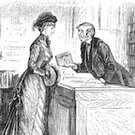Title: Clytie
Author and Title: Joseph Hatton. Clytie: A Novel of Modern Life
First Edition: London: Chapman and Hall, 1874. 3 volumes, post 8vo, 31s. 6d.
Serialization: Gentleman's Magazine, March 1873 to May 1874 (monthly)
Summary: The orphaned Mary Weller lives with her grandfather Luke Weller in the cathedral town of Dunelm (real-life Durham) where he plays the organ. Her mother was an actress under the name of "Olivia Pitt" who ran off with the Hon. Frank St. Barnard: the two were allegedly married in France before Frank abandoned the pregnant Olivia. Shortly after giving birth in Boulogne, she died of smallpox. Now seventeen and a beauty, Mary gains the attention of two men: the nouveau riche Philip Ransford and the poorer Tom Mayfield. Whereas the latter's intentions are completely honorable, Ransford's are not: he plies her with expensive gifts and letters behind her grandfather's back while trying to induce her to run away with him. She refuses. The title of the novel comes from the bust of Clytie owned by Mayfield—her likeness to Mary leads to much soliloquizing by the young man. Mayfield thwarts Ransford by telling Weller of his attentions to his granddaughter. Mary chafes under her grandfather's distrustful gaze and leaves town alone for London where she plans to follow her mother on the stage. (The night she leaves, there is some confusion about whether she left with Mayfield or Ransford.) In London, Mary inadvertently (and briefly) goes into a house of ill repute before being rescued by a kindly police officer who brings her to the respectable Breeze family where she boards. Her grandfather arrives in London and dies before finding her. While attempting to become an actress, Mary comes across Ransford who pursues her again. On the night she is to debut on stage, the company goes bankrupt and she learns she has inherited a small fortune from her paternal grandfather Lord St. Barnard. Four years pass. During that time Ransford has lost his fortune, Mary has married Lord St. Barnard (the nephew for the last lord), and Mayfield has gone to the goldfields of California. Mayfield returns to London as the wealthy poet of the Sierras "Hugh Kalmat" in time to see Ransford's attempt to blackmail the St. Barnards lead to a libel prosecution by the peer. The highly publicized case features a lengthly cross-examination of Mary by Ransford's unscrupulous barrister Simon Cuffing in which he insinuates numerous stains on her honor related to her parentage, her running away from home, and her time on stage. The grueling five-day questioning—described as "legal torture" in the text—causes Mary to break down and flee England. Mayfield, working anonymously, finds proofs of her parent's marriage and her birth. Ransford, in a moment of conscience and greed, agrees to repudiate his slanders on Mary in exchange for ten thousand pounds. Mayfield confronts Ransford, challenges him to a duel, and kills the villain after Ransford dishonorably fires early. The murder, due to Cuffing's cover up, is adjudged a suicide. Lord and Lady St. Barnard go on to live a happy life and Mayfield returns to America. The court case at the center of the novel is based on the real-life libel case of Sir Travers Twiss in 1872. (TJB)
Title Tags:
References: Bodleian; EC
Texts
- Volume 1 from Google Books
- Volume 2 from Google Books
- Volume 3 from Google Books
- Search for title at The Online Books Page (please note: the search will take you out of At the Circulating Library)
